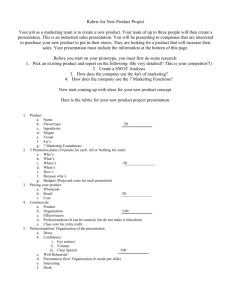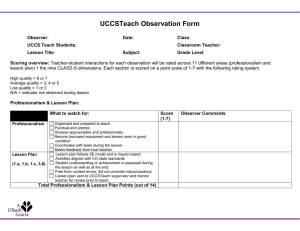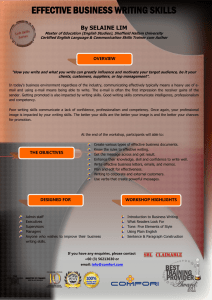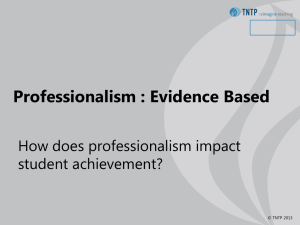TEACHER PROFESSIONALISM By Suyato Senior Lecturer at Yogyakarta State University,
advertisement
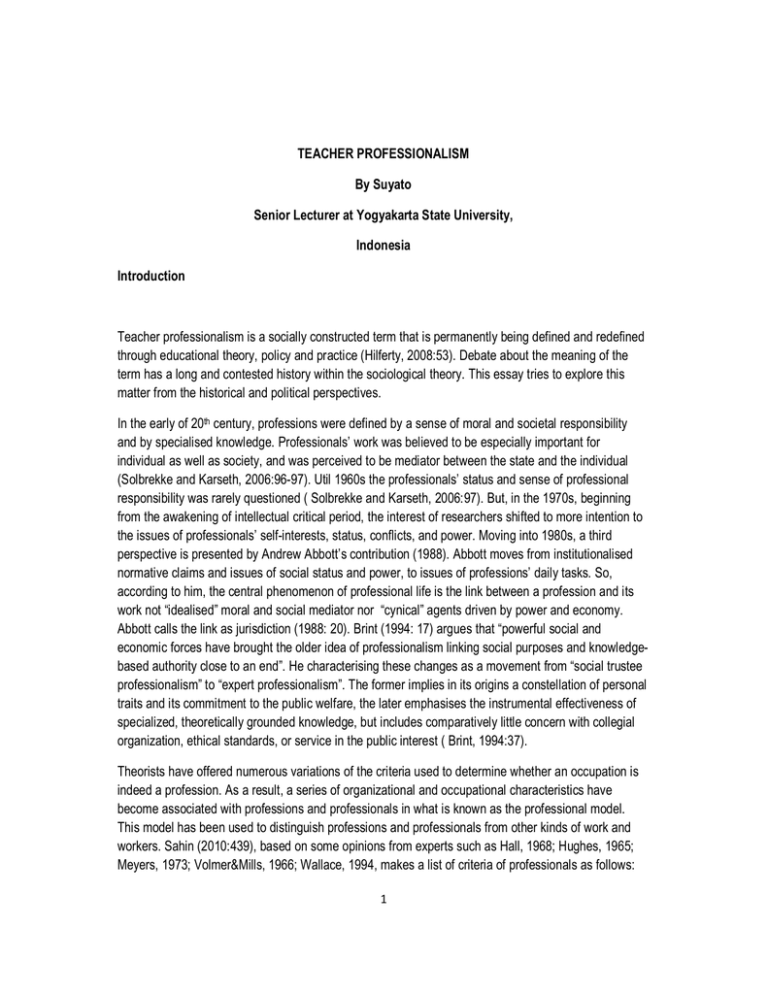
TEACHER PROFESSIONALISM By Suyato Senior Lecturer at Yogyakarta State University, Indonesia Introduction Teacher professionalism is a socially constructed term that is permanently being defined and redefined through educational theory, policy and practice (Hilferty, 2008:53). Debate about the meaning of the term has a long and contested history within the sociological theory. This essay tries to explore this matter from the historical and political perspectives. In the early of 20th century, professions were defined by a sense of moral and societal responsibility and by specialised knowledge. Professionals’ work was believed to be especially important for individual as well as society, and was perceived to be mediator between the state and the individual (Solbrekke and Karseth, 2006:96-97). Util 1960s the professionals’ status and sense of professional responsibility was rarely questioned ( Solbrekke and Karseth, 2006:97). But, in the 1970s, beginning from the awakening of intellectual critical period, the interest of researchers shifted to more intention to the issues of professionals’ self-interests, status, conflicts, and power. Moving into 1980s, a third perspective is presented by Andrew Abbott’s contribution (1988). Abbott moves from institutionalised normative claims and issues of social status and power, to issues of professions’ daily tasks. So, according to him, the central phenomenon of professional life is the link between a profession and its work not “idealised” moral and social mediator nor “cynical” agents driven by power and economy. Abbott calls the link as jurisdiction (1988: 20). Brint (1994: 17) argues that “powerful social and economic forces have brought the older idea of professionalism linking social purposes and knowledgebased authority close to an end”. He characterising these changes as a movement from “social trustee professionalism” to “expert professionalism”. The former implies in its origins a constellation of personal traits and its commitment to the public welfare, the later emphasises the instrumental effectiveness of specialized, theoretically grounded knowledge, but includes comparatively little concern with collegial organization, ethical standards, or service in the public interest ( Brint, 1994:37). Theorists have offered numerous variations of the criteria used to determine whether an occupation is indeed a profession. As a result, a series of organizational and occupational characteristics have become associated with professions and professionals in what is known as the professional model. This model has been used to distinguish professions and professionals from other kinds of work and workers. Sahin (2010:439), based on some opinions from experts such as Hall, 1968; Hughes, 1965; Meyers, 1973; Volmer&Mills, 1966; Wallace, 1994, makes a list of criteria of professionals as follows: 1 (a) provide a unique function (b) must respond to advanced training requirements; (c) control the standards for the profession’s education and training; (d) require an extended period of professional socialization; (e) require some form of licensure or certification; (f) abide by specific forms of practice or professional ethics; (g) belong to a self-regulating professional organization; (h) have influence over legislation related to their profession; (i) have a strong sense of professional identification; (j) require a process for induction; (k) participate in professional development; (l) are specialist; (m) have a high level of autonomy and authority; (n) have a relatively high prestige, earning potential, and power; and (o) be client-centred. However, in conducting his research, he has refined these criteria to delineate only ten characteristics of profession, as below: (1) essential service to society and acceptance by the society; (2) special knowledge and skills, include content knowledge, general pedagogical knowledge, curriculum knowledge, pedagogical content knowledge, knowledge of learners and their characteristics, knowledge of educational contexts, and knowledge of educational ends, purposes, and values; (3) credentials and advanced university training; (4) code of ethics; (5) professional organization; (6) induction; (7) professional development-in-service training; (8) specialization; 2 (9) autonomy and authority; and (10) compensation (Sahin, 2010:439-443). Long ago, professionalism was viewed as a defining characteristic of the industrial society, which implies a power network. In this perspective, Parry and Parry (in Ozga and Lawn, 1981) define professionalism as strategy to penetrate the power network in a given context. Meanwhile, Hargreaves (2000) sees its meaning as socially constructed and subject to geographical and cultural differences in interpretation. Furthermore, he states that professionalism can be seen as ‘improving quality and standards of practice’. In addition, Helsby (1999) states that professionalism implies not only special expertise but also altruistic concern to improve practice constantly in the interest of the clients. This means that in order to be professional, teachers should be ready to develop their practices continuously for the well-being of clients. In other words, professionalism means having personal and behavioural characteristics of dedication, commitment and highly skilled practice. Eraut (1994) considers professionalism as an ‘ideology’. McIntyre explains that professionalism as an ideology ‘embodies appealing values, in this case those of service, trustworthiness, integrity, autonomy and reliable standards’ (Eraut, 1994:viii). Therefore, he confirms that ‘it works in the interest of certain groups-those occupations recognised as professions’. Sachs (2000) sees professionalism as a political project. Sockett (1993) adds a moral base to professionalism by stating that there are four types of teacher professionalism, namely: character, commitment, subject knowledge, and pedagogical knowledge. In brief, professionalism is about the ‘quality of the practice’. In this respect, McClaughlin (1997) argues that professionalism must be rebuilt around the challenges to practice. In a situation of rapid change, professionalism requires that teachers redefine their role according to social, moral and emotional contexts. Debates about the meaning of teacher professionalism circulate in scholarly and public debates with regularity. Some of them serve purely ideological interests, usually those of the state’s or employing authority, concerned with controlling teachers individually and collectively by specifying the skill, competencies, and attributes of teachers along a narrow technicist line (Sach, 2003:5). As Grace (1987: 195) states: “Ideologies of professionalism can be made to serve the interests of the state for control and containment of teachers or they can be effectively deployed by teachers to improve their terms and conditions of service and their enjoyment of social status and occupational autonomy”. Others have strongly advocated that teaching is a profession, providing strong evidence to support such claims. These debates have used a variety of theoretical orientations and positions. Some have drawn on Marxist theory, whereas others provide a more functionalist theoretical perspective. Some academic writers have developed typologies about the various discourse of teacher professionalism or have identified historical phases of teacher professionalism (Sach, 2003:5). 3 The lack of consensus regarding what constitutes teacher professionalism cannot be underestimated, especially if we want to revitalise this profession using the broader political and social strategy. As Hargreaves and Goodson (1996:4) state: “What it means to be professional, to show professionalism or to pursue professionalization is not universally agreed or understood...what counts as professional knowledge and professional action in teaching is open to many interpretations”. Sach has made distinctions between ‘old’ and ‘new’ form of teacher professionalism (2003:6). The ‘old’ form of teacher professionalism draw on established studies of professionalism and professionalization in order to argue the case of teaching as a profession. Otherwise, the ‘new’ form of teacher professionalism takes into account previous debates about teacher professionalism but assumes a changed analytical perspective from which to understand professionalism. Generally, the Western literature in the field of teacher professionalism is quite consistent in asserting that reforms endanger the teacher’s professionalism (Rosenholtz, 1991; Tomlinson, 1995; McLaughlin, 1997; Day, 1999; Bullough, 2000; McCulloch et al., 2000). The literature indicates increasing examples where professionalism has been prone to a lack of resources, more restrictions and a lack of political support (Barber, 1995; Day, 1999; Hargreaves, 2000). Therefore, current reform initiatives are seen as weakening rather than strengthening teacher professionalism. Because of the problems including fear of economic decline and cultural dissolution and the new challenges in students’ behaviour and needs, state politicians tend toward tightening control over the educational systems in order to raise standards. As a result, teacher professionalism in term of autonomy may become threatened rather than strengthened. According to Rosenholtz (1991:214), regulating the content and process of education seem to lead to both enhancement of schooling and a ‘waste of human potential, school mediocrity, and lost teacher commitment’. In other words, at a time when there is an increasing need to raise the standards of the teaching force to combat rapid reform, the opposite seems to happen (Goodson and Hargreaves, 1996). Day (1999:6-7) asserts that the current wave of educational reform has hindered teachers’ professionalism ‘caught in the midst of new worlds of reform, teachers in many countries have cited ways in which their ability and motivation to behave as professionals have been negatively affected. Furthermore, he reminds us that our energies could be exhausted because of constant change and restructuring. Teacher professionalism has relevant significance in education in that it affects the role of the teacher and his or her pedagogy, which in return affects the student’s ability to learn effectively. It can be defined as the ability to teach students in a meaningful way, developing innovative approaches to mandated content while motivating, engaging, and inspiring young adult minds to prepare for everadvancing technology. However, this definition does little to exemplify precisely how a professional teacher carries him or herself. As a socially constructed term, teacher professionalism should be located in the relation to changing historical, political and social contexts. As a form of ideology, professionalism can operate “as a strategy for control of teachers manipulated by the State, while also being used by teachers to protect themselves against dilution (Ozga and Lawn, 1981:v). 4 Hargreaves and Goodson (1996) contribute to the debate by asserting that any form of professionalism situated in the personal practical knowledge of teacher and may prevent reflection on the broader moral and social function of education. This form of practice has been categorised in the literature as “practical professionalism”. Bottery and Wright (2000) propose the alternative ecological model of professionalism not only by acknowledging the practical wisdom of teachers but also calling on teachers to collectively develop a professional response to the injustices and corruptions of society where economics dominate policy making. Accordingly, they intend to create teachers who are reflective of their own practice, adaptable to change, and as active and informed citizens, can make meaningful contributions to the development of a genuinely participatory democratic and just society. This discussion has characterized professionalism as a site of struggle (Hanlon, 1998; Sach, 2003). The struggle between de-professionalising and re-professionalising forces. It is Hargreaves (1999) who has identified four broad historical stages in the changing nature of teacher professionalism, that this struggle is a phenomenon of what he has termed the “post-professional age”. As we know, he draws fours ages of professionalism as follows: 1. The pre-professional age-where teaching was seen as a commonsense craft and good teachers were those who could manage a classroom and get their message across to their pupils; 2. The age of professional autonomy-characterised by teacher claims to professional expertise and the presumed right to autonomy which followed such claims; 3. The age of the collegial professional-characterised by role expansion where focus extends beyond the individual teacher and classroom; and 4. The post-professional age-is characterised by a struggle forces intent on de-professionalising teaching and counterpart who wish to redefine teacher professionalism in more positive, reflective, and far-reaching, as well as integrated ways. A recent survey of literature by Benade (2009: 12) suggests that there are a variety of models of teacher professionalism that inform any consideration of the concept, namely: (1) the altruistic, selfregulated academic specialist acting as autonomous moral agent; (2) the superior practitioner working in an autonomous environment; (3) the reflective and effective classroom practitioner; (4) teachers as self-empowering critical activists; (5) the teacher as gatekeeper of cultural capital; and the task-focused expert motivated by concern for students and school; and (6) the teacher as de-professionalised contract worker. Each of those can be explained as follows. The altruistic, self-regulated academic specialist acting as autonomous moral agent is a concept that regards teacher is professional as he/she is an expert with command of a body of technical or esoteric knowledge, has a central social function or has ‘a service rather than profit orientation’, has selfknowledge and exercises professional autonomy and is one who performs a vital public function ( Benade, 2009:13). Meanwhile, the superior practitioner working in an autonomous environment 5 suggests that a professional teacher is distinguished by superior competence and performance and should be rewarded for this attribute. The reflective and effective classroom practitioner is an account that is implied rather than stated directly. Effective teacher is one who is self-reflective, has a wide knowledge base (content, strategies, and students) and uses strategies such as feedback to improve student learning. Teacher as self-empowering critical activist is teacher self-consciously making his/her own reality by reflecting critically both his/her practice as well as the policy that shapes his/her working lives. Rather than being passive recipient of policy, teacher ought to contribute actively in shaping policy the teacher under work. The teacher as gatekeeper of cultural capital acknowledges that teaching is culturally significant. Teachers are an educated middle class with privileged access to the stored ‘cultural capital of society and have enormous influence on the present and future thinking of society members. The task-focused expert motivated by concern for students and school is the desired end point of the systemic reform programmes of the neo-liberal and new Right project. It is believed that teachers are professionals by virtue of their expertise in managing student learning, accounting for their own performance and assisting their schools in attaining and maintaining externally imposed accountability targets. Cood (1997) refers this view of professionalism as “technocratic-reductionists”, where a professional is deemed to be one who has technical expertise over a range of pre-determined objectives. Teacher as de-professionalised contract worker has been degraded by the reform of the 2980s (Cood, 2005). The aims of education have shifted from preparation to participate in a society of educated, democratic citizenry to preparation to participate in the world of work and meet the challenges of a competitive global economy. Education, especially in areas such as assessment, curriculum are under greater control of state and through accountability regime. This control, according to Cood (2005: 194), has manifested itself in a highly tailored education system that has brought about situation in which ‘the culture of professionalism has been largely surrendered to a narrow and reductionist instrumentalism. Accordingly, teacher have become ‘managed professionals’. Some citations on Teacher Professionalism and Education Policy Hustler et. Al (2003) in their research found that most teachers were satisfied with their CPD experiences, that teachers valued CPD they saw as relevant to their own schools or classrooms and that took into consideration their existing knowledge, and that teachers were critical of ‘one size fits all’ standardized approaches. Jeffrey (2002: 531) argues that a ‘humanist’ discourse is under threat from the growing dominance of a ‘performativity’ discourse but suggest that there is some space for teachers to ‘reconstitute’ the performativity discourse ‘through the maintenance of humanist relations’. 6 Hodkinson and Hodkinson (2004) communities of practice can sometimes operate at ‘close-knit’ group levels to mediate wider organizational influences on individual practice. Leaton-Gray’s (2006) argues that existing, and outmoded, organizational structures are at odds with the demands made on teachers to prepare their students for the future and that a new model of the teaching profession is needed which values the ‘human face’ of teaching over the organizational one and which provides teachers with greater professional autonomy. Locke, et.al. (2005: 555), based on a collaborative research project in England and New Zealand which examined the impact of education policy on primary teachers’ work and professional identities, describe a shift in policy discourse from a ‘professional-contextualist’ conception of teacher professionalism towards a ‘technocratic-reductionist’ conception, associated with an increase in constraints on teacher autonomy. They argue, furthermore, that teachers’ perceptions of the implications of this shift for their sense of professionalism were largely dependent upon how extrinsic accountability demands ‘were filtered through the profession's defining quality, namely teachers' altruistic concerns for the welfare of the children in their care’. Locke, T. (2001) recognizes that professionalism is a contested concept, but Locke draws on ‘the classical formulation of teacher professionalism, based around notions of expert knowledge, altruism and autonomy’ in order to explore processes of de-professionalization amongst teachers. Using survey data collected from teachers in New Zealand and the UK, Locke paints a complex picture suggesting that while many teachers have a sense of their professionalism having been eroded in the course of the 1990s, partly as a consequence of the curriculum and assessment reforms to which they have been subject in both countries, teachers have responded in diverse ways to the reforms. Locke argues that these responses are shaped by different modes of professional identification. Maguire, M. (2005:440) Examines the role of social class in the formation of teachers’ identities and in shaping their daily lives through in-depth exploration of the case of one secondary school teacher who self-identifies as working-class but who has ‘crossed classes’ as a consequence of her education and occupation. Uses data from an interview with this teacher to illustrate and illuminate some of ‘the micro-practices and textures of class that are woven into the fabric of everyday life in school’. Mahony and Hextall, (2000) evaluate critically the recent reforms to teacher education and the governance of teachers’ work, showing how national teaching standards and the wider currents of performance management in which they are embedded serve to fundamentally reshape both the form and content of teaching. NUT (2005) explores changes in teacher professionalism in England and Wales in the light of shifts in government policy, especially the emergence of the ‘new professionalism’ and the changing demands of schools and their wider communities. Osborn et.al (2000) examines the impact of the National Curriculum and assessment reforms on English primary schools. They explore how teachers ‘recreated’ these policies on the ground, focusing on their values, their relationships with colleagues and students and their curricula and pedagogic practices. It has both a descriptive and an explanatory agenda, and highlights the crucial role headteachers can play in mediating and softening the pressures of external demands on teachers. 7 Richardson (2002) re-affirms constructions of the teacher not only as an artist, craftsperson and performer but also as a maker of communities and of history. Robson (2005) analyses the effects of the raft of performance and standards regulations on the work of teachers in both FE and HE, brings out some of the commonalities and contrasts between the two sectors. In assessing the effects of regulative change, particularly the pressures of new forms of accountability, on teacher autonomy, collegiality and identity, he argues that the relatively poorer working conditions of the FE sector needs to be understood as a product of the status gap between the vocational and the academic. Shulman and Shulman (2004) elaborate the idea of 'teacher learning communities' especially in relation to the goal of 'theory-rich, open-ended, content-intensive classrooms' and proposes a framework for analysing the components of teacher learning in communities, a framework which encompasses teacher-student relations, institutional factors and policy contexts. Smyth, et.al (2000) explore the implications of economic globalization for the labour process of teaching, highlight the profound impact of neo-liberalism on teachers’ work as well as teachers’ creative responses to the new forms of surveillance and control they are experiencing. Webb,et.al (2004) explore the implications of educational reforms for teachers’ work and their perceptions of teaching as a profession in both countries. The authors identify positive factors influencing teacher retention – commitment to children, professional freedom and supportive colleagues – and negative ones – work intensification, low pay, deteriorating pupil behaviour and a decline in public respect. The paper concludes with policy recommendations aimed at enhancing teacher commitment and promoting retention. Webb et.al (2004:83) analyse comparatively of policy makers’ and teachers’ conceptions of teacher professionalism in England and Finland. These authors argue that while in England policy agendas were shaped by a standards-focused 'commercialized professionalism’, in Finland notions of ‘teacher empowerment' were more dominant. They suggest that in both countries teachers’ conceptions of their professionalism were changing but in different ways, reflecting ‘past and present ideology, policy and practice’. Conclusion In conclusion, a completed definition of teacher professionalism far exceeds the simple notion that a teacher be prepared in a certain manner. A professional is trained to handle all situations, as most episodes in the classroom require quick thinking. Also, teacher professionalism extends beyond one’s ability to understand content; the educator must discover if the students are being reached in an effective way. With the role of “teacher” becoming more autonomous, an educator must be competent in their studies, perform well under the eye of the administration and parents, while maintaining good conduct to facilitate quality communication. References 8 Abbott, A. (1988). The system of professions: an essay on the division of expert labor. Chicago: University of Chicago Press. Barber, M. (1995). Reconstructing the teaching profession. Journal of education for teaching, vol. 21, 1, pp. 75-85. Benade, L. (2009). The New Zealand draft curriculum 2006: a policy case study with specific reference to its understanding of teaching as an ethical profession. Policy Futures in Education Vol. 7 (1) pp.5-19. Bottery, M., and Wright, N., (2000). Teachers and the state: Towards a directed profession. London: Routledge. Brint, S., (1994). In a age of experts. Princeton: Princeton University Press. Bullough, Jr R.V. (2000) Teacher education reform as a story of possibility: lessons learned, lessons forgotten. The American Council on Education’s Commission on Teacher Education (19391942).Teaching and Teacher Education, Vol.16,2, pp.131-145. Cood, J. (1997). Knowledge, Qualifications and Higher Education: a critical view, in M. Olssen & K. Morris Matthews, Education Policy in New Zealand: the 1990s and beyond. Palmerston North: Dunmore Press. Cood, J. (2005). Education Policy and the Challenges of Globalisation, in J. Cood & K. Sullivan, Education Policy Directions in Aotearoa New Zeland. Southbank: Thomson Dunmore Press. Day, C.(1999). Developing teachers. The challenges of lifelong learning. London: The Falmer Press. Eraut, M.(1994) Developing professional knowledge and competence. London: The Falmer Press. Goodson, I. And Hargreaves, A. (eds.)(1996) Teachers’ professional lives. London: The Falmer Press. Grace, G. 1987. Teachers and the state in Britain: a changing relationship, in M. Lawn and G. Grace (eds) Teachers: the cultures and politics of work. London: Palmer Press. Hargreaves, A. And Goodson, I. 1996. Teachers’ professional lives: aspirations and actualities, in I Goodson and A. Hargreaves (eds) Teachers’ professional lives. London: The Falmer Press. Hargreaves, A. (2000). Four ages of professionalism and professional learning. Teachers and teaching: history and practice. Vol.6,2. pp.151-182. Helsby, G. (1999). Changing teachers’ work. Buckingham: Open University Press. Hilferty, F. “Teacher professionalis and cultural diversity; skills, knowledge and values for a changing asutralia” The Australian Educational Researcher, Vol 35, No.3, December 2008. Hodkinson, H. and Hodkinson, P. (2004) ‘Rethinking the concept of community of practice in relation to schoolteachers’ workplace learning’, International Journal of Training and Development, 8 (1): 21–32. 9 Hustler, D., McNamara, O., Jarvis, J., Londra, M., Campbell, A. and Howson, J. (2003) ‘Teachers’ perceptions of continuing professional development’, DfES research report, no. 429, London: HMSO. Jeffrey, B. (2002) ‘Performativity and changing teacher relations’, Journal of Educational Policy, 17 (5): 531–46. Leaton-Gray, S. (2006) Teachers Under Siege, Stoke-on-Trent: Trentham Books. Locke, T. (2001) ‘Curriculum, assessment and the erosion of professionalism’, New Zealand Journal of Educational Studies, 36 (1): 5–23. Locke, T., Vulliamy, G., Webb, R. and Hill, M. (2005) ‘Being a ‘professional’ primary school teacher at the beginning of the 21st century: a comparative analysis of primary teacher professionalism in New Zealand and England’, Journal of Education Policy, 20 (5): 555–81 Mahony, P. and Hextall, I. (2000) Reconstructing Teaching: standards, performance and accountability, London: Routledge Falmer. McCulloch, G., Helsby, G., and Knight, P., (2000). The politic of professionalism: teachers and the curriculum. London: Continuum. McLaughlin, M.W., (1997). Rebuilding teacher professionalism in the United States, in: Hargreaves, A., and Evans, R., (eds) Buying teachers back. Buckingham: Open University Press. NUT (2005) ‘Professionalism Today’, special issue of Education Review, 18 (2). Osborn, M., McNess, E. and Broadfoot, P., with Pollard, A. and Triggs, P. (2000) What Teachers Do: changing policy and practice in primary education, London: Continuum. Ozga, J., and Lawn, M. (1981). Teachers, professionalism and class: a study of organized teachers. London: The Falmer Press. Richardson, R. (2002) In Praise of Teachers: identity, equality and education: six topical lectures, Stoke-on-Trent: Trentham Books. Robson, J. (2005) Teacher Professionalism in Post-Compulsory Education: overcoming obstacles and creating opportunities, London: Routledge. Rosenholtz, S.J.,(1991). Teachers’ workplace: the social organization for schools. New York: Teacher College Press. 10 Sachs, J. 2003. The activist teaching .Buchkingham-Philadelphia: Open University Press. Sahin, A.E. (2010) “Professional status of elementary teaching in Turkey: a Delphi study” . Teachers and Teaching: theory and practice. Vol. 16, No. 4, August 2010, 437-459. Shulman, L. S. and Shulman, J. H. (2004) ‘How and what teachers learn: a shifting perspective’, Journal of Curriculum Studies, 36 (2): 257–71. Smyth, J., Hattam, R., Reid, A. and Shacklock, G. (2000) Teachers' Work in a Globalizing Economy, London: Falmer Press. Sockett, H., (1993). The moral base for teacher professionalism. New York: teacher College Press. Solbrekke, T.D., and Karseth, B., (2006). “Professional Responsibility: An Issue for Higher Education?Higher Education, Vol. 52. No. (Jul., 2006), pp. 95-119. Accessed: 11/08/2010 23:48. Tomlinson, J. (1995). Professional development and control: the role of the general teaching council. Journal of education for teaching, vol.21, 1, pp.59-68. Webb, R., Vulliamy, G., Hämäläinen, S., Sarja, A., Kimonen, E. and Nevalainen, R. (2004) ‘Pressures, rewards, and teacher retention: a comparative study of primary teaching in England and Finland: Scandinavian Journal of Educational Research, Vol. 48 (2), pp. 169-188. 11
